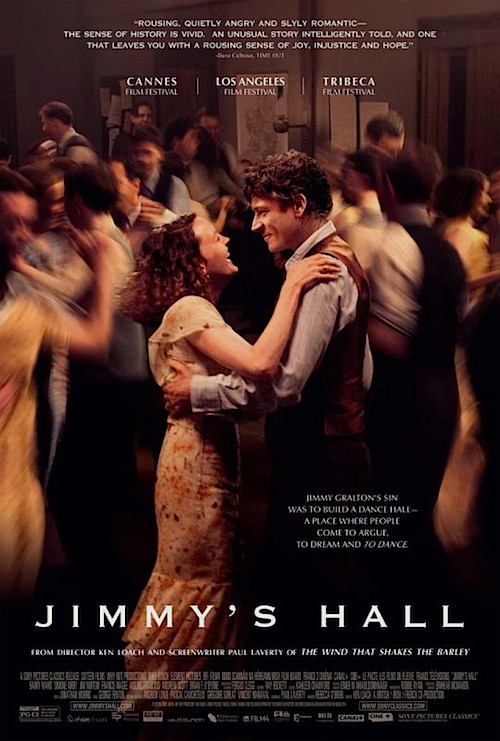By Joe Bendel. The Pearse-Connolly Hall was sort of like a cross between Hull House and Café Society in rural County Leitrim, but with way more ideology. It was founded by Irish Communist organizer James Gralton, who was not about to let a wee little thing like the Ukrainian Famine dampen his enthusiasm for an all-powerful state. He became the only Irishman deported from his homeland, but fortunately he still had his American citizenship from his previous stint in exile. Gralton’s final Irish residency gets hagiographic treatment in Ken Loach’s Jimmy’s Hall, which opens this Friday in New York.
Throughout his life, Gralton did a considerable amount of Atlantic-hopping, agitating and fighting in the 1920s uprising, only to periodically retreat to New York whenever things got too hot. In 1932, he thought he was returning for good, in order to help his mother run the family farm. Of course, it is only a matter of time before he reopens the torched Pearse-Connolly Hall, which he bills as a community center of sorts. Boxing lessons and art classes are indeed held there, as well as militant organizing sessions. It is enough to send Father Sheridan, the parish priest into full crisis management mode.
 Frankly, instead of Jimmy’s Hall, Loach should have called the film The Passion of the Gralton. Like most heroes of propaganda films, Gralton is pretty darn dull, but it is not the fault of lead actor Barry Ward, who brings an earthy, unassuming charisma to the role. Unfortunately, Loach always makes him the calmest, most rational person in every conversation. “That’s an argument for another day” he says evasively, when Father Sheridan challenges him on the Soviet human rights record. Yes, isn’t that always the case? However, there is no time like the present to settle scores with those on Loach’s enemies list, starting with the Catholic Church and the British government.
Frankly, instead of Jimmy’s Hall, Loach should have called the film The Passion of the Gralton. Like most heroes of propaganda films, Gralton is pretty darn dull, but it is not the fault of lead actor Barry Ward, who brings an earthy, unassuming charisma to the role. Unfortunately, Loach always makes him the calmest, most rational person in every conversation. “That’s an argument for another day” he says evasively, when Father Sheridan challenges him on the Soviet human rights record. Yes, isn’t that always the case? However, there is no time like the present to settle scores with those on Loach’s enemies list, starting with the Catholic Church and the British government.
Far and away, the best sequences in Jimmy’s Hall involve Gralton’s impossible love for his now married old flame Oonagh. Star-crossed romance is tough to beat. Unfortunately, the instructive drama is appallingly stilted. Yet, despite the lengths Loach goes to stack the deck against good Father Sheridan, he cannot overwhelm the twinkle in Jim Norton’s eye. By the second act, most of the audience will be rooting for wily Father and against the Socialist sob sisters. Even more strangely, the film completely wastes the compulsively watchable Andrew Scott (Jim Moriarty in Sherlock and the voice of Tom Hardy’s high strung assistant in Locke) as the younger and hipper Father Seamus.
Loach has made some wonderfully humanistic films, like Looking for Eric and The Angels’ Share that reflect his proletarian sympathies without didactically bashing the audience over the head. Unfortunately, Jimmy’s Hall is not one of them. Aside from Gralton’s stolen moments with Oonagh, it is a rather slow and lecturey experience. Deeply disappointing, Jimmy’s Hall opens this Friday (7/3) in New York, at the Angelika Film Center, just in time for Independence Day.
LFM GRADE: D
Posted on July 3rd, 2015 at 12:29am.